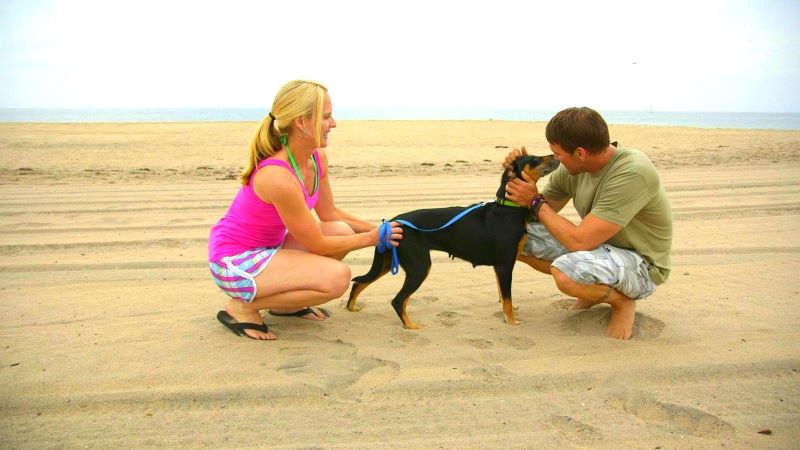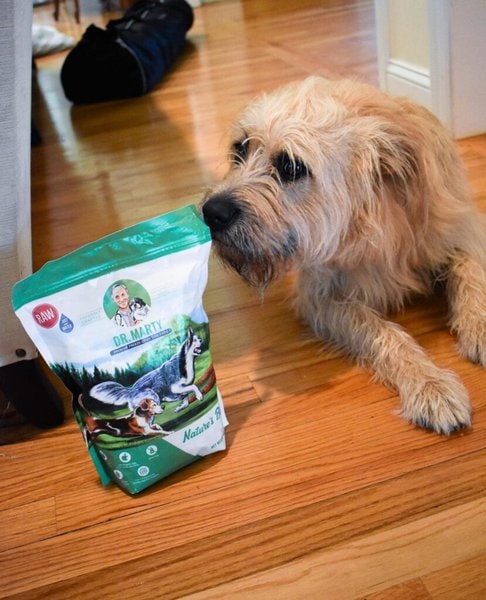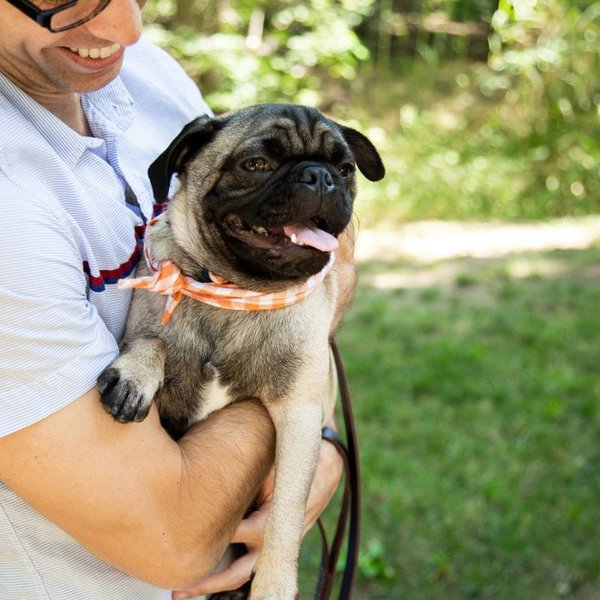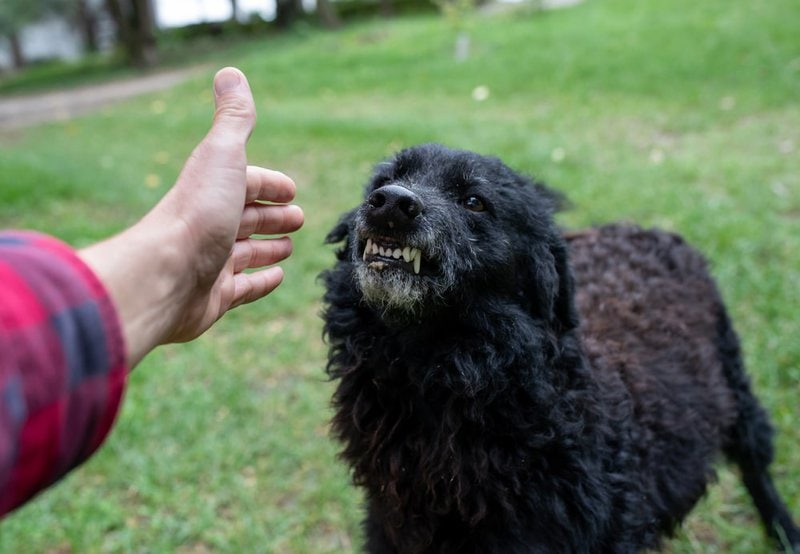It can be quite bothersome whenever your dog barks continuously at people. This becomes especially uncomfortable when your family and friends come by for visits, or when you take your dog on a walk and you cannot walk a stretch without your dog going ballistic and barking at bystanders. Fortunately, you can stop your dog from barking at people. However, the step in fixing a problem is understanding the root of the problem – why do dogs bark at people?
Dogs bark at people because in many cases, they are not accustomed to being around strangers other than their families. Dogs also have keen observation skills, meaning that they can read human body language well enough to sense suspicion or threat based on a person’s actions and bark in response.
Barking is a form of communication for dogs, so when they bark they intend to draw your attention to something. Sometimes your dog can simply be barking to express their excitement while greeting people.
In this article, we will be discussing the other reasons why dogs bark at strangers, certain people, and visitors. Then we will give you some useful tips on how to stop your dog from barking at strangers.
At What Age Do Dogs Start Barking At Strangers?
This behavior typically begins when your dog is about 8 weeks old. Your dog can be barking at strangers because of their instinct to claim and protect their territory, to alert their owners of an unknown individual, or to simply greet the stranger.
Protecting Their Territory
Dogs are territorial animals. They consider their home to be their territory, so when an unknown individual or animal enters their home, they consider it to be an invasion of their territory.
However, your dog’s territory is not limited to your home, your dog can consider areas surrounding your home to be their territory as well. You can identify your dog’s territorial barking when they bark at strangers from the window, gate, or car.
The barrier between your dog and the supposed perpetrator may arouse frustration within your dog, which will cause them to bark even louder and more aggressively. As the supposed perpetrator gets closer to your dog, their barking will most likely get louder and more urgent.
Alerting Their Owners
Many dogs are not initially too fond of strangers. Dogs typically bark at strangers to alert their owners of this stranger’s presence. In addition, dogs also tend to bark in response to strange or startling noises.
When your dog is scared or senses a threat, they will bark to alert you of what they consider to be a possible threat. If you want to identify whether your dog is alarm barking, you should take note of their body language.
The difference between alarm barking and territorial barking is the fact that your dog will bark at the stranger regardless of where they are. With territorial barking, your dog will only bark at the stranger if the stranger is intruding on your dog’s territory.
When your dog is alarm barking, they will usually have stiff body language. Alarm barking towards unsuspecting strangers is very common among dogs who have not been allowed to socialize with people besides their family.
Greeting The Stranger

Since barking is a means of communication for dogs when your dog barks it may not necessarily be an indication of something negative. Dogs can bark as a means of expressing their excitement as well.
When your dog wants to greet strangers or simply acknowledge their presence, they will offer them a few barks.
This type of barking is fundamentally different from alarm and territorial barking. You can easily notice the difference by observing that your dog’s body language will not be tense, but rather happy and inviting. Your dog’s tail will typically also be wagging.
Why Do Dogs Bark At Certain People?
Your dog barks at certain people because it is not fond of that person’s odor, or that person’s body language may be unsettling to your dog.
Another reason is that your dog may have been mistreated in the past and the trauma it has been through may cause it to bark at any stranger.
Odor
We are all that dogs have an impressively keen sense of smell, so when an odor is not pleasant to them, that odor may be overbearing. You may have noticed that when someone comes over to visit, one of the first things that your dog does is sniff the person.

This is how dogs interact with different people and animals. If your dog smells someone and it is not fond of its odor, its interaction with that particular person will lead to a hostile response and barking should follow.
This may be the case when your dog smells like a cat or another dog. Dogs typically dislike the odor of vinegar, rubbing alcohol, and citrus.
Body Language
Along with a great sense of smell, dogs are also quite observant. Dogs are able to read people’s body language and take note of even minor changes. When someone’s body language suggests that the person may pose a threat, your dog will bark at them.
This is also true when the person is behaving unusually towards you. When someone is acting aggressively towards you, your dog will bark at them in an attempt to protect you.
Past Trauma
We already know that dogs are observant and once they have sniffed you, they will be able to recognize you based on your odor and remember the odor well. If someone verbally or physically mistreated your dog, your dog will not likely forget the culprit, even when that traumatic experience has passed with time.
When the culprit returns to your home, your dog will not give that person a warm welcome, but barking as a response. Since that person is associated with a negative memory or its traumatic experience, your dog will not only regard the culprit as a threat to them but to you too.
When someone resembles or bears a similar scent to the person who mistreated your dog, your dog’s initial reaction to that person will be to bark at them incessantly until they deduce that the person is no longer of a threat or a person of interest.
How Do I Get My Dog To Stop Barking At Strangers?
The first step to stopping your dog from barking at strangers is to identify why they are doing so. Ultimately, to stop your dog from barking at strangers, you should improve their socializing skills, teach them some commands, and distract them.
Improve Socialisation

In this case, the earlier you allow your dog to socialize with other people and pets, the better your dog will behave. Early socialization is essential when trying to teach your dog how to react to being around strangers.
You should take your dog out on walks as often as you can. Walks do not only satisfy your dog’s physical needs, but it also allows your dog to become accustomed to being around several strangers.
When dogs are kept away from strangers and only socialize with their families, they may grow to be aggressive towards visitors and strangers. Frequent exposure to strangers allows your dog to learn ways to appropriately react to strangers.
Teach Commands
Like simple commands such as ‘sit’ and ‘fetch’, you can teach your dog commands that calm them down when they are barking. A common command for this purpose is ‘quiet’.
Allow your dog to bark a few times then use the ‘quiet’ command and give them a treat once they respond to it. Like any other type of training, repetition and consistency is the key.
After your dog has mastered this command within closed doors, you can step it up a notch and train him while you are out on walks.
Distract Them
When your dog starts barking at strangers, you can get them to stop by distracting them from the strangers. You can use some keys to create a sound that will draw your dog’s attention to you rather than the strangers.
When you are walking with your dog, you can carry small treats that you can use to reward your dog for good behavior or to distract them once you notice that they have become fixated on a stranger passing by.
Another method to distract your dog is by crossing the street or turning the corner once you notice a stranger approaching. However, this is not a long-term solution, it will be healthy to teach your dog to ignore strangers rather than isolate your dog from them.
Why Does My Dog Go Crazy When We Have Visitors?

When you have visitors, your dog may go crazy because it is excited, nervous, curious, cautious of the visitors, and wants to protect their territory or seek some attention.
In any case, their overzealous reactions quickly become frustrating and difficult to deal with. Here are a few tips to help you deal with your dog when you have visitors.
Never Punish Your Pooch
When you have visitors, your dog can be barking at someone specifically because it is anxious or cautious of that visitor. Your dog will be stressed as well. Punishing your dog for barking in such circumstances will only add to their stress and anxiety levels, thereby worsening the situation.
The next time someone visits you, your dog will be more likely to bark at the visitor because they will associate the presence of a visitor with the punishment that you have given them.
Hence, you should not be punishing your dog. It is more effective to train your dog to react appropriately to visitors. In this way, you will not accidentally teach your dog to fear or dread upon the presence of visitors, in turn leading to further bad behavior.
‘Go To Your Place’ Method
This is a command method that requires you to tell your dog to go to their place, which can be their bed, crate, or doggy house. This will allow your dog to calm down in its ‘safe space’. Only after they have calmed down and your visitor has settled in, you can then allow your dog to greet them.
When using this method, the use of treats is vital. By rewarding your dog for doing as they are told, they will subconsciously associate obedience with treats and rewards. Most of the time, dogs love pleasing their owners so with some patience, your dog will pick up on this training.





